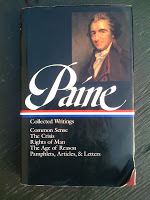| Numinous The Music of Joseph C. Phillips Jr. |
The Numinosum Blog
 I just finished my third summer read Common Sense by Thomas Paine, the book I was reading before getting sidetracked with Malcolm Gladwell's Outliers. Over the past year or so, I've been researching Thomas Paine for an upcoming dance collaboration between choreographer Edisa Weeks and her company Delirious Dances and myself and my group Numinous. The new work will be based on the writings of Thomas Paine (the "forgotten Founding Father") and will be part of a larger symposium we are planning on the meaning of democracy and freedom in today's world, particularly here in the United States. The premiere will be taking place in June 2010 here in New York City and I will be blogging more about the project in the weeks and months to come. I suggested Thomas Paine to Edisa as a subject for collaboration but I'll admit at that time my knowledge of him was minimal beyond the basic outline of his life and some of his well-known aphorisms and quotes (for example, "these are the times that try men's souls" from American Crisis). But once we decided to do the project, I began reading up on his life and role in the founding of the United States, being particularly fascinated by the account of his legacy in Harvey Kaye's book Thomas Paine and the Promise of America. Having been sufficiently maligned over the centuries by many specious rumors and writings especially after speaking out about religion and politics in The Age of Reason, today when people speak of the Founding Fathers, rarely is there mention of Thomas Paine and the effect this Briton and his thought had on the movement toward independence and democracy in the middle 18th century. And those thoughts, a call to action so to speak, are crystallized in Common Sense. Common Sense is an open letter "addressed to the inhabitants of America." Reading it, my first thoughts were, had he lived today, Thomas Paine would definitely be a blogger of the first order. He gives passionate and reasoned arguments for why America should not be a colony of Britain, how a monarchy or any dependency can never achieve it's full potential, and why action (both political and military) is sometimes necessary in achieving and securing freedom. But one thing I was struck with is how in February of 1776 (5 months before the Declaration of Independence) Paine was able to articulate an impressively prescient vision of what America could possibly become ("we have every opportunity and every encouragement before us, to form the noblest purest constitution on the face of the earth. We have it in our power to begin the world over again"). And to the modern day constructionists that say all Founding Fathers felt America is "God's country" and religious thought is essential to governmental action, his answer to a long-forgotten Quaker rebuttal to not fight for independence should give ample pause for thought: "And here without anger or resentment I bid you farewell. Sincerely wishing, that as men and christians, ye may always fully and uninterruptedly enjoy every civil and religious right; and be, in your turn, the means of securing it to others; but that the example which ye have unwisely set, of mingling religion with politics, may be disavowed and reprobated by every inhabitant of AMERICA." With hindsight, the correct course of action to independence seems preordained but I'm intrigued by how even something as monumentally important (and again with hindsight, obvious) as independence and freedom, was viewed by some as the wrong path to undertake. It is a helpful lesson of history to know there will always be (and should be) naysayers and doubters; that in a democracy questioning and debate is healthy and needed. But that we should be wary of all those "interested men, who are not to be trusted; weak men, who cannot see; prejudiced men, who will not see" and who will hold up and block progress for everyone because of parochial concerns (something the politicians in the recent imbroglio in the New York State Senate should have remembered). With Common Sense, Thomas Paine calls to action all citizens to be active not only in the discussion of democracy and freedom, but in the maintenance of it as well (although, I'm not sure he was meaning for women, slaves, or Native Americans but I'll give him the benefit of the doubt with the spirit of his words). Next up for Summer Read #4: The Invention of Hugo Cabret by Brian Selznick POSTED BY NUMINOUS AT 1:53 PM
0 Comments
Your comment will be posted after it is approved.
Leave a Reply. |
The NuminosumTo all things that create a sense of wonder and beauty that inspires and enlightens. Categories
All
|
Thanks and credit to all the original photos on this website to: David Andrako, Concrete Temple Theatre, Marcy Begian, Mark Elzey, Ed Lefkowicz, Donald Martinez, Kimberly McCollum, Geoff Ogle, Joseph C. Phillips Jr., Daniel Wolf-courtesy of Roulette, Andrew Robertson, Viscena Photography, Jennifer Kang, Carolyn Wolf, Mark Elzey, Karen Wise, Numinosito. The Numinous Changing Same album design artwork by DM Stith. The Numinous The Grey Land album design and artwork by Brock Lefferts. Contact for photo credit and information on specific images.
 RSS Feed
RSS Feed